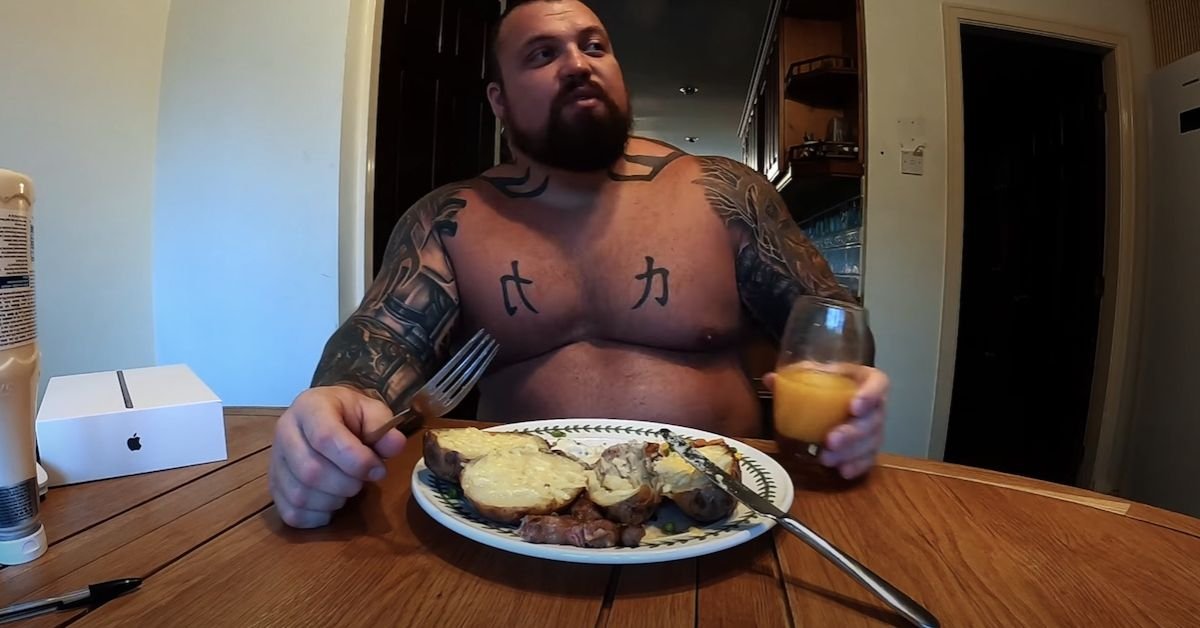In an eye-opening update, strongman champion Eddie Hall, renowned for his staggering 500kg deadlift, reveals the astonishing dietary regimen that fuels his immense strength. Consuming between 12,000 to 20,000 calories daily during his peak, Hall’s unique meal plan includes a staggering variety of foods, from raw steak breakfasts to multiple lengthy lunches, illustrating how he maintains his massive frame. As Hall embarks on a new chapter in boxing with a significantly reduced intake of 6,000 to 7,000 calories, his dedication to both rigorous training and strategic nutrition continues to captivate fans and fitness enthusiasts alike.
Understanding Eddie Hall’s Insatiable Appetite: The Strongman Diet
Eddie Hall’s staggering caloric intake is not just for show; it’s a carefully curated part of his success in the realm of strongman competitions. During these rigorous events, maintaining enormous muscle mass and high energy levels is crucial, and he has meticulously crafted his daily diet to meet these demanding requirements. Hall once remarked in an interview, “Eating is part of my job, you can’t expect to lift the weight I do without the fuel. It’s about turning food into strength, and I’ve perfected that art.” His intense training regimen goes hand in hand with this extraordinary diet, forging a physique that has made him a household name in the world of strength sports.
What sets Hall apart is his dedication to a structured eating schedule that mimics a well-oiled machine. This consists not just of sheer volume but also of the right balance of macronutrients. His consumption of protein, fats, and carbohydrates aligns strategically with his training times—ensuring his body is primed for recovery post-workout and adequately fuelled for the next one. This concept of ‘food timing‘ plays a significant role in sports nutrition, and Hall embodies it to the extreme, creating a punishing regime designed to maintain peak performance.
The Unconventional Meals of a Strongman Champion
Hall’s breakfasts challenge conventional meal ideas, defying what most would consider balanced or healthy. Rising at 3 AM, his preference for raw steaks isn’t just a quirky choice; it’s an energy strategy. Raw meat is nutrient-dense and provides quick nourishment, allowing Hall to commence his day with power. As he transitions to a full English breakfast by 7 AM, he effortlessly fuels his body for the physically demanding day ahead. The sheer volume of his meals places him in a league of his own, such as the staggering thought of devouring a family-sized cheesecake for lunch before heading into a busy afternoon of further eating and training.
This approach surprises many, especially those who find a single meal a challenge to complete. For Hall, the tradition of meals is broken; he often requires two lunches in what can only be described as a meal marathon session. Incorporating foods like ribeye and lavish amounts of pasta highlights not just his indulgence but his need for substantial caloric intake. The bulk of the ingredients he consumes per meal could easily serve multiple individuals, marking his diet as an extreme reflection of his lifestyle and the physical intensity that comes with it.
Dietary Shifts for Boxing and MMA: A Strategic Evolution
In 2025, when Hall began his transition from strongman to boxing, a significant dietary adjustment followed. The drastic cut from 15,000 calories to 6,000-7,000 calories was no small feat. Hall confessed that this was a ‘sacrifice’ in his eyes, emphasising the necessity for muscle control and agility in combat sports. However, even at these seemingly reduced figures, Hall’s meals remain rich and decently balanced—still heavily centred around protein with food items like chicken and nuts making frequent appearances.
His foray into MMA pushed him further down the path of dietary restrictions, adopting a carnivore diet that touted meat, eggs, and dairy as its staple. This stark simplification of his diet highlights a trend seen in many athletes focusing on muscle retention while optimising fat loss. Remarkably, Hall managed to lose weight while gaining muscle, showcasing how dietary strategies can significantly impact body composition. It’s a testament to his knowledge and understanding of nutrition—a key tool even beyond strength sports.
The Gruelling Training Regimen: A Match for His Diet
Eddie Hall’s training ethic perfectly complements his eating habits; both require extreme commitment and focus. Training every day without rest, Hall often dedicates over eight hours solely to physical conditioning. Breaking down his activities reveals a rigorous schedule that includes extensive physiotherapy, weight training, and even cardio, indicating how dedicated he is to his sports discipline. With 1.5 hours devoted to stretches and another 1.5 to recovery practices, every facet of his workout is meticulously planned to ensure peak performance at competitions.
The cycle of rigorous workouts demands an equally intense recovery plan. Hall’s supplement intake reflects his commitment to holistic health; 21 various vitamins and nutrients are consumed thrice daily, acting as a safety net for his strenuous training. This careful orchestration of diet and exercise illustrates just how much Hall invests in his modern-day gladiatorial lifestyle, ensuring he not only meets but exceeds the physical demands put upon him by strongman competitions and now, high-level fighting.
Conclusion: Eddie Hall’s Journey as a Testament to Commitment
Eddie Hall’s lifestyle is a living example of extreme commitment to both diet and fitness. The way he approaches each meal, each workout, incrementally reveals the intense dedication required for success in broadcast sports. Most people view food simply as sustenance, but Hall has managed to elevate eating into a science that fuels his incredible feats of strength and endurance.
In a world where fitness norms emphasise moderation and balance, Hall’s story is one for the ages—a reminder that some paths to success are paved with mountains of food and sheer determination. As Hall continues to navigate his evolving career, one can only imagine how his eating habits and training techniques will adapt in the near future, drawing keen interest from fans and aspiring athletes alike.
| Key Point | Details |
|---|---|
| Eddie Hall’s Daily Caloric Intake (Peak Strongman) | 12,000 to 15,000 calories, sometimes reaching 20,000 calories. |
| Breakfast Habits | Starts at 3 AM with raw steaks and protein shakes; first official breakfast at 7 AM includes a full English breakfast. |
| Typical Meals | Includes multiple breakfasts, large portions of ribeye steak, pasta, cheesecake, and various snacks throughout the day. |
| Diet Changes for Boxing and MMA | Reduced intake to 6,000-7,000 calories with a focus on meats, eggs, and dairy (carnivore diet), losing 19 pounds while gaining muscle. |
| Training Routine | Daily training includes 1.5 hours each of physio, hot/cold treatment, stretching, 4 hours of weight training, and 1 hour of cardio (total approx. 8.5 hours). |
| Supplement Routine | Takes 21 different vitamins and nutrients three times daily. |
| Recovery Regimen | Involves daily hot and cold therapies, hyperbaric chamber sessions, and physiotherapy. |
Eddie Hall’s extraordinary diet exemplifies the extreme dedication required in professional strength sports, showcasing how caloric intake directly supports his intense training regimen. As he transitions to combat sports, the question remains: how will he adapt his nutrition and training yet again to meet new physical demands?
Frequently Asked Questions About Eddie Hall’s Diet & Training
How many calories does Eddie Hall consume daily?
Eddie Hall consumes between 12,000 to 15,000 calories each day during his strongman days, with some days reaching up to 20,000 calories, which is equivalent to what most people eat in a week.
What does Eddie Hall’s typical meal plan look like?
Eddie Hall’s meal plan includes multiple enormous meals throughout the day, starting with high-protein breakfasts like raw steaks and ending with desserts such as half a family-size cheesecake, ensuring vast amounts of protein and carbohydrates.
How has Eddie Hall’s diet changed with different sports?
When shifting to boxing, Hall reduced his intake to 6,000-7,000 calories daily but maintained high-protein meals. His recent switch to MMA introduced a carnivore diet, focusing on meat, eggs, and dairy to lose weight while building muscle.
What does Hall’s training regimen include?
Eddie Hall’s training routine consists of intense daily workouts that incorporate weight training, cardio, stretching, and recovery sessions, totalling around 8.5 hours of training and therapy each day.
How does Eddie Hall approach recovery and supplementation?
Hall utilises a comprehensive recovery plan that includes hot and cold therapies, hyperbaric chamber sessions, and takes 21 different vitamins and nutrients multiple times a day to maintain his physical condition.







